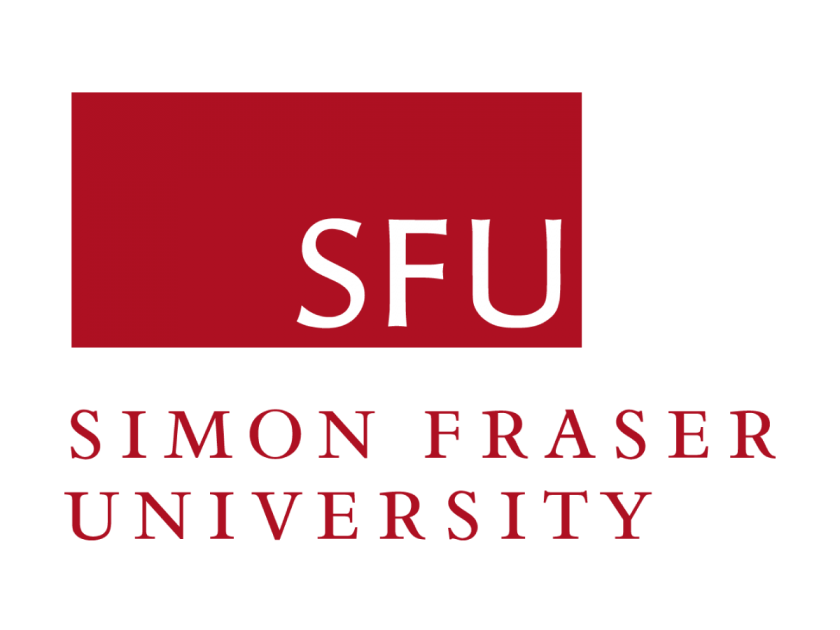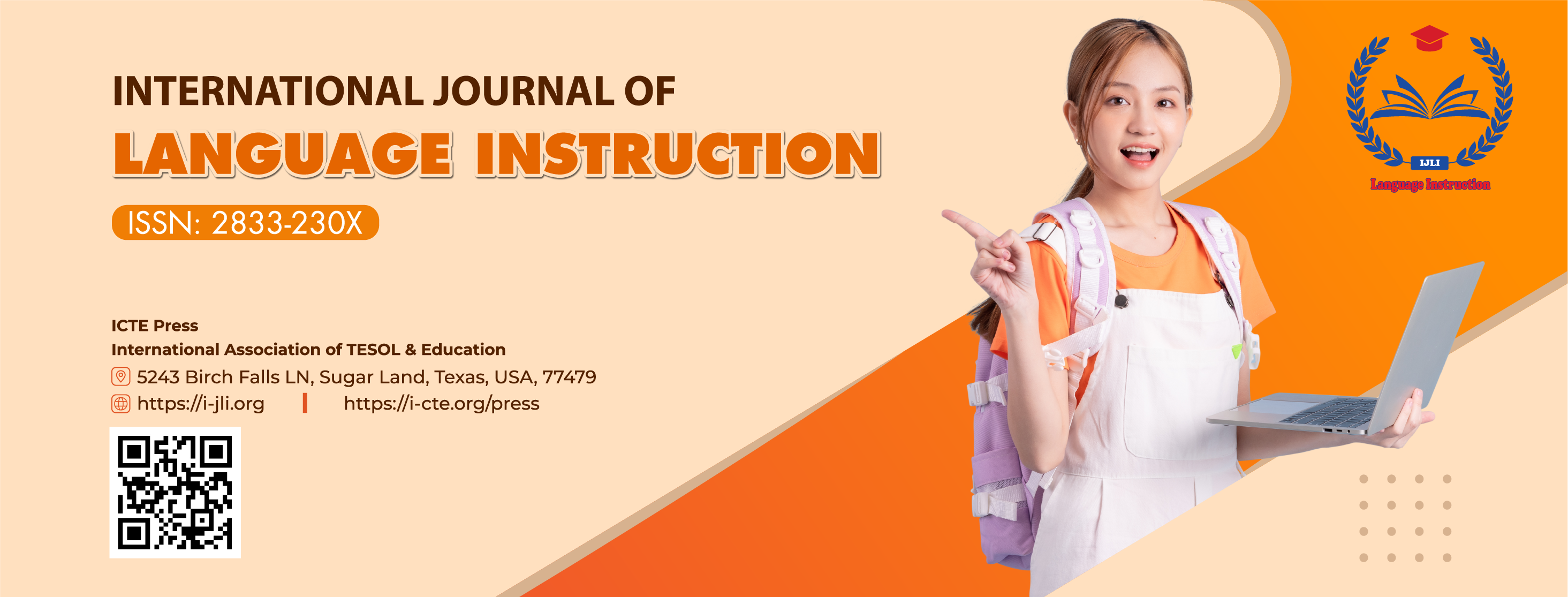The Use of TED Talks to Enhance EFL Students’ Public Speaking Skills: English-Majored Seniors’ Practices and Perceptions
DOI:
https://doi.org/10.54855/ijli.24315Keywords:
TED Talks, public speaking, perceptions, practicesAbstract
The integration of technology in language education is now standard in the 4.0 era of industry, with TED Talks aligning seamlessly with this trend. This study investigates how EFL students at Van Lang University use the TED Talks platform to enhance their public speaking. Using both quantitative and qualitative methods—online questionnaires and interviews—the study involved sixty-one senior EFL students. Results reveal that these students regularly turn to TED Talks as a learning tool to refine their speaking skills. Beyond aiding learning, students perceive TED Talks as crucial in enhancing their public speaking performance. The research suggests further exploration into EFL teachers' perspectives on integrating TED Talks, the platform's effectiveness in enhancing various language skills, and the factors contributing to its optimal use in EFL classrooms.
References
Abdulrahman, T. R. (2017). TED Talks as listening teaching strategy in EAP classroom. ELE Publishing; Chief Editor of Asian ESP.
Ahluwalia, G. (2018). Students’ Perceptions on the Use of TED Talks for English Language Learning. Language in India.
Ahn, T., & Lee, S. (2016). User experience of a mobile speaking application with automatic speech recognition for EFL learning. British Journal of Educational Technology, 47(4), 778–786. https://doi.org/10.1111/bjet.12354
Al-Jarf, R. (n.d.). TED Talks as a Listening Resource in the EFL College Classroom, Online Submission, 2021. Retrieved from https://eric.ed.gov/?q=ted+talks&pg=2&id=ED615127
Aleles, J., & Hall, M. (2016). TED Talks for Authentic Learning: An academic oral communication course for improving presentation skills for EFL university students. International Journal of Humanities and Management Sciences, 4(1), 39-42
Anderson, C. (2016). TED Talks: The official TED guide to public speaking: Tips and tricks for giving unforgettable speeches and presentations. Hachette UK.
Baker, J., & Westrup, H. (2006). Essential Speaking Skill (2nd ed.). London: Continuum.
Bello, T. (1999). New avenues to choosing and using videos. TESOL Matters, 9(4), 1-20.
Borras, I., & Lafayette, R. G. (1994). Effects of multimedia courseware subtitling on the speaking performance of college students of French. The Modern Language Journal, 78(1), 66-75. https://doi.org/10.2307/329253
Chaney, A. L., & Burk, T. L. (1998). Teaching Oral Communication in Grades K-8. Allyn and Bacon, OrderProcessing, PO Box 11071, Des Moines, IA 50336-1071.
Choirunnisa & Sari. (2021). TED Talks Use in Speaking Class for Undergraduate Students. Retrieved from https://doi.org/10.37905/jetl.v2i1.7319
Chollet, M., Wörtwein, T., Morency, L. P., Shapiro, A., & Scherer, S. (2015, September). Exploring feedback strategies to improve public speaking: an interactive virtual audience framework. In Proceedings of the 2015 ACM International Joint Conference on Pervasive and Ubiquitous Computing (pp. 1143-1154). ACM
Cohen, S. S. (1994). Speaking freely. Foreign Affairs, 73, 194–197. Retrieved from https://doi.org/10.2307/20046818
Coxhead, A. (2018). Using TED Talks in the classrooms. RELC. Singapore: SEAMEO
Dunar, H. (2015). My Public Speaking. (n.d.). Retrieved from https://books.google.com.vn/books?hl=vi&lr=&id=7qJLDwAAQBAJ&oi=fnd&pg=PP1&dq=Hilbram+Dunar&ots=1Znu8Njy2Y&sig=1Iobiij-N_cNEt0DeLnChR8csW4&redir_esc=y#v=onepage&q=Hilbram%20Dunar&f=false
Indrawati, E. (2018). Improving Self-Confidence of Adolescence through Counseling Directive. International Journal of Science and Research (IJSR), 7, 373–375.
Gallo, C. (2014a, September 25). New survey: 70% say presentation skills are critical for career success [Web log comment]. Retrieved from http://www.forbes.com/sites/carminegallo/2014/09/25/new-survey-70-percent-say-presentation-skills-critical-for-career-success/ #142038e010c9
Graddol, D. (2006). English Next. London: British Council.
Gunadi. (1998). Himpunan Istilah Komunikasi (D. Herfan (ed.). Jakarta: Grasindo.
Hamad, M. M., Metwally, A. A., &Alfaruque, S. Y. (2019). The Impact of Using YouTube and Audio Tracks Imitation YATI on Improving Speaking Skills of EFL Learners. English Language Teaching, 12(6), 191–198. Retrieved from: https://doi.org/10.5539/elt.v12n6p191
Hamilton. (2012). Essentials of Public Speaking. WADSWORTH CENGAGE Learning.
Hamilton, C. (2012). Essentials of public speaking. Retrieved from https://openlibrary.org/books/OL25330600M/Essentials_of_public_speaking
Harmer, J. (2007). The practice of English language teaching (4th ed.). Harlow: Pearson Longman.
Heriansyah, H. (2012). Speaking Problems Faced by the English Department Students of Syiah Kuala University. Lingua Didaktika, 6, 37-44. Retrieved from https://doi.org/10.24036/ld.v6i1.7398
Hinchey, P. H. (2008). Action research primer. New York: Peter Lang.
History of TED. (n.d.). Retrieved from https://www.ted.com/about/our-organization/history-of-ted
Hsu, W. (2020). Can TT transcripts serve as extensive reading material for mid-frequency vocabulary learning? TEFLIN Journal: A publication on the teaching and learning of English, 31(2), 181-203.
Ivanova, T., Gubanova, N., Shakirova, I., & Masitoh, F. (2020). Educational technology as one of the terms for enhancing public speaking skills. Universidady Sociedad, 12(2), 154-159.
Johnson, J. R., & Szczupakiewicz, N. (1987). The public speaking course: Is it preparing students with work-related public speaking skills? Journal of Communication Education, 36(2), 131–137.
Khamkhien, A. (2010). English Speaking and English Speaking Tests in the Thai context: A reflection from Thai perspective. English Language Teaching, 3(1), 184-190.
Kusuma, L. A. (2017). Islamic-Content-TED public speaking as a source material for improving Islamic student’s communication skill. Journal of English Education Society, 2(2), 75-90. Retrieved from https://doi.org/10.21070/jees. v2i2.1007
Lamerton, J. (2001). Public Speaking (Everything you need to know). London: Harper Collins Publisher
Li, T. (2015). Effectiveness of TED Talks on public speaking skills among University students. Higher Education Studies.
Liu, M. (2011). Anxiety in oral English classrooms: A case study in China. Indonesian Journal of English Language Teaching, 3, 119-137.
Mandal, F. B. (2014). Nonverbal Communication in Humans. Journal of Human Behavior in the Social Environment, 24(4), 417–421. Retrieved from https://doi.org/10.1080/10911359.2013.831288
Maria, M. H., Junior, V. C., & Astrid, R. V. (2018). TED talks as an ICT tool to promote communicative skills in EFL students. English Language Teaching, 11(12), 106-115. Retrieved from: https://doi.org/10.5539/elt.v11n12p106
McConnon, Shay. (2002). Presenting with Power. Captivate, Motivate, Inspire and Persuade (pp. 70- 80). Oxford: How to Books Ltd.
Nguyen, Ch., & Boers, F. (2019). The Effect of Content Retelling on Vocabulary Uptake from a TED Talk. TESOL Quarterly, 53(1), 5-29. Retrieved from https://doi.org/10.1002/tesq.441
Nguyen, T. D. T., & Pham, V. P. H. (2022). Effects of using technology to support students in developing speaking skills. International Journal of Language Instruction, 1(1), 1-8. DOI: https://doi.org/10.54855/ijli.22111
Nguyen, T. T., & Tong, T. T. N. (2024). Investigation into Difficulties in Public Speaking among English-majored Students at University of Phan Thiet. International Journal of Language Instruction, 3(1), 17-30. DOI: https://doi.org/10.54855/ijli.24312
Nurmukhamedov, U. (2017). Lexical Coverage of TED Talks: Implications for Vocabulary Instruction. TESOL Journal 2017, 8(4), 768-790. DOI: https://doi.org/10.1002/tesj.323
Nursafira, M. S. (2020). TED Talks in EFL Context: An Alternative Way for Teaching and Improving Students' Speaking Skills. Journal of English Language Studies, 44(2), 5-50. Retrieved from https://doi.org/10.31849/elsya.v2i2.3968
O‟Hair, D., H. Rubenstein, & R. Stewart. (2010). A Pocket Guide to Public Speaking. Third edit. Bedford/St. Martin's
Penny, M. (2006). Assessing Young Language Learners. Inggris: Cambridge University Press.
Pinar, G., & Aránzazu. (2019). Getting Closer to Authenticity in the Course of Technical English: Task-Based Instruction and TED Talks. English Language Teaching Retrieved from https://doi.org/10.5539/elt.v12n11p10
Raja, F. (2017). Anxiety level in students of public speaking: Causes and remedies. Journal of Education and Educational Development, 4 (1), 94-110.
Robinson, T. E. (1997). Communication apprehension and the basic public speaking course: A national survey of in‐class treatment techniques. Communication Education, 46, 188–197. https://doi.org/10.1080/03634529709379090
Romanelli, F., Cain, J., & McNamara, P. J. (2015). Should TED Talks be Teaching Us Something? American Journal of Pharmaceutical Education, 78 (6), 4-58. Retrieved from http://dx.doi.org/10.5688/ajpe786113
Rubenstein, L. D. (2012). Using TED Talks to inspire thoughtful practice. The Teacher Educator, 47, 261–267. doi: https://doi.org/10.1080/08878730.2012.713303
Rudneva, M., Valeeva, N., Faizi, R., Guslyakova A., Nigmatzyanova Y. (2019). TED Talks for enhancing listening comprehension skills at University level. INTED2019 Proceedings (pp.5070-5073). Retrieved from http://doi.org/10.21125/inted.2019.1261
Salaberry, R. M. (2001). The use of technology for second language learning and teaching: A retrospective. The Modern Language Journal, 85(1), 39-56.
Salim, A. (2015). General Self-Confidence and its implications on Students’ Achievements in Oral Presentation. JEELS, 36(2), 34 – 48. Retrieved from http://dx.doi.org/10.30762/jeels.v2i2.95
Sari, F. M. (2018). Patterns of Teaching-Learning Interaction in the EFL Classroom. Teknosastik: Jurnal Bahasa dan Sastra, 16(2), 41-48
Sherman, J. (2003). Using authentic video in the language classroom. Cambridge: Cambridge University Press.
Shyam, S. S., & Irene, E. J. (2016). Public speaking skills. In: Training manual on Theeranaipunya-Equipping fisherwomen youth for future. ICAR-Central Marine Fisheries Research Institute, Kochi, 129-132.
Skehan, P., & Foster, P. (1999). The influence of task structure and processing conditions on narrative retellings. Language Learning, 49(1), 93-120. Retrieved from: http://dx.doi.org/10.1111/1467-9922.00071
Spratt, C., Walker, R., and Robinson, B. (2004). Mixed research methods: Practitioner research and evaluation skills training in open and distance learning. Burnaby, BC: Commonwealth of Learning.
Stempleski, S. (1992). Teaching communication skills with authentic video. In: S. Stempleski and P. Arcario (Eds.), Video in Second Language Teaching: Using, Selecting, and Producing Video for the Classroom (pp. 1-24). Alexandria, VA: Teachers of English to Speakers of Other Languages, Inc.
Tafazoli, D., & Romero, M. (2016). Multiculturalism and technology-enhanced Language Learning. United States of America: IGI Global.
Taibi, D., Chawla, S., Dietze, S., Marenzi, I., & Fatahu, B. (2015). Exploring TED talks as linked data for education. British Journal of Educational Technology, 64(5), 1092-1096. Retrieved from https://doi.org/10.1111/bjet.12283
Trilling, B., & Fadel, C. (2009). Bernie Trilling, Charles Fadel-21st Century Skills_ Learning for Life in Our Times –Jossey Bass (2009). Retrieved from https://www.wiley.com/en-us/21st+Century+Skills%3A+Learning+for+Life+in+Our+Times-p-9780470553916
Ur, P. (1996). A Course in Language Teaching: Practice and Theory. Cambridge University Press.
Zou, W. &. (2018). A DNA nanorobot functions as a cancer therapeutic in response to a molecular trigger in vivo. Retrived from https://doi.org/10.1038/nbt.4071
Wrench, J. S., Goding, A., Johnson, D. I., & Attias, B. A. (2012). Public speaking: Practice and ethics. Retrieved from http://2012books.lardbucket.org/books/publicspeaking-practice-and-ethics/
Wright, K. B. (2005). Researching Internet-based populations: Advantages and disadvantages of online survey research, online questionnaire authoring software packages, and web survey services. Journal of computer-mediated communication, 10(3), 25-50. Retrieved from https://doi.org/10.1111/j.1083-6101.2005.tb00259.x
Yee, K. M., Jafre, M., & Abidin, Z. (2014). The Use of Public Speaking in Motivating ESL Learners to Overcome Speech Anxiety. International Journal on Studies in English Language and Literature, 2(11), 127–135. Retrieved from www.arcjournals.org
Zappa-Hollman, S. (2007). Academic presentations across post-secondary contexts: The discourse socialization of non-native English speakers. Canadian Modern Language Review, 63(4), 455–485. Retrieved from http://dx.doi.org/10.3138/cmlr.63.4.455
Ziebell, B. (2019, June 6). Teaching English with TED talks: Create your own ESL materials (full guide). Connections. Retrieved from https://eltabbjournal.com/teaching-english-with-ted-talks skills effectively, and if so, what specific skills have you improved and why?
Downloads
Published
Issue
Section
License
Copyright (c) 2024 Tran Ngoc Kim Cuong, Nguyen Thi Thu Hang

This work is licensed under a Creative Commons Attribution 4.0 International License.
The copyright of all articles published in the International Journal of Language Instruction (ijli) remains with the Authors, i.e. Authors retain full ownership of their article. Permitted third-party reuse of the open access articles is defined by the applicable Creative Commons (CC) end-user license which is accepted by the Authors upon submission of their paper. All articles in the ijli are published under the CC BY-NC 4.0 license, meaning that end users can freely share an article (i.e. copy and redistribute the material in any medium or format) and adapt it (i.e. remix, transform and build upon the material) on the condition that proper attribution is given (i.e. appropriate credit, a link to the applicable license and an indication if any changes were made; all in such a way that does not suggest that the licensor endorses the user or the use) and the material is only used for non-commercial purposes.
Authors are able to enter into separate, additional contractual arrangements for the non-exclusive distribution of the journal's published version of the work (e.g., post it to an institutional repository, in a journal or publish it in a book), with an acknowledgment of its initial publication in this journal.











